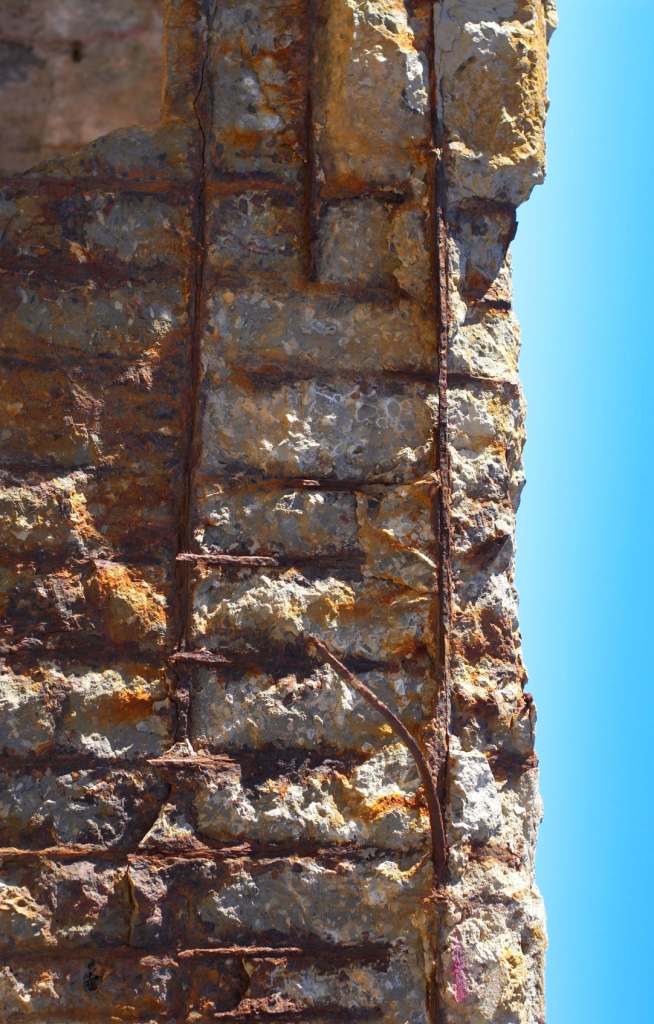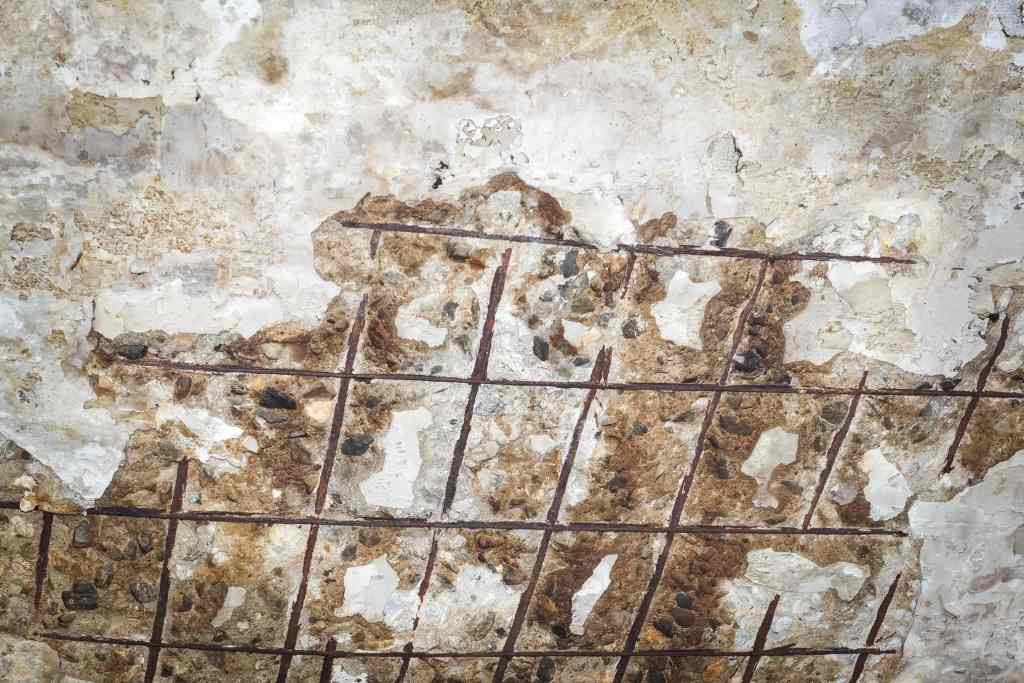Before understanding the steel corrosion let’s get an idea about reinforced concrete structure.
A reinforced concrete structure is a structure made up by casting the concrete into the mould (shuttering) after embedding steel reinforcement into the formwork. Embedded steel reinforcements increase the tensile i.e. bending strength of the concrete frame.
The important question is
What is Corrosion of Steel Reinforcement?

Steel corrosion is the process of degradation of steel reinforcement due to the chemical or electrochemical reaction in concrete occurring due to manual or environmental action.
Here the iron i.e. Fe get oxidized to iron oxide FeO or Fe2O3 forming a film of scale around the bar causing expansion of bar, which ultimately creates cracks in concrete.
Corrosion is like cancer, if not attended in time, it can cause serious problem. You therefore need to take all preventive measures in the beginning and once it appears, you need to take immediate curative actions.
Steel increase in its volume when they corrode and set up internal stress in concrete. The internal stress causes cracks and later causes spalling of concrete, dislodging cover of reinforcement from the concrete. Steel corrosion seriously damages the structure, and ultimately if not repaired at an early stage, the structure may lead to serious repair including partial or total collapse of the structure.
Corrosion is not visible all the time. Therefore, it needs to be identified the risk of reinforcement corrosion in concrete structure. We have already discussed the methods which helps to find out the location of reinforcement corrosion in concrete.
What causes corrosion of reinforcement steel in concrete?
During the service life, the embedded steel gets corroded due to many reasons. The primary reasons are presence of moisture and lack of adequate concrete cover to steel. There are other reasons which also causes corrosion of reinforcement steel in concrete. i.e. the process of carbonation, electrolysis, alkali-aggregate reaction in concrete. Steel reinforcements also gets corroded due to the use of calcium chloride (CaCl2) as the accelerator, outside and inside moisture presence in concrete, the presence of chemicals like soluble sulphate in water. Sometimes, impurities like inorganic compounds, sulphates and chlorides present in mixing or curing water also causes the corrosion in concrete.
Following are the factors which cause steel Corrosion in the concrete structure:
01. Effect of inside Moisture:
The moisture present in the pours of concrete acts like an electrolyte and it reacts with the cement which causes the corrosion of steel bars.
Hence low permeability concrete is not suitable in an area where the humidity is high in the atmosphere.
02. Leakage/Dampness:

If the concrete is highly permeable, the seepage and leakage from the toilets, plumbing pipes, terrace, damp walls, basements, etc. leads to the corrosion of steel bar in concrete. Water leakage is the main cause of early onset of corrosion and concrete deterioration as it acts as electrolyte. If the source of the water leakage or seepage is left unattended, it can cause structural damage . Hence when you repair corrosion damaged structure, it is also important that you take preventive actions i.e. stop leakage of water.
03. Inadequacy of Concrete Cover:
If the concrete cover is inadequate, then the concrete is corroded soon due to the entry of moisture. Inadequate concrete cover not only encourage the entry of moisture but also speed up the process of carbonation as well as ingress of chlorides, etc. It is advisable to provide concrete cover as recommended in IS:456.
04. Carbonation:
Hydration of cement hardens the concrete, at the same time calcium hydroxide is liberated, which set up a protective layer around the steel reinforcement. But, in the course of time, free hydroxide in concrete reacts with atmospheric carbon dioxide and form the calcium carbonate which results in shrinkage cracks. The reaction is also known as carbonation. It is the alkalinity of concrete which protects steel from corrosion. Once alkalinity is gone, there is no more protection. It reduces the alkalinity and breaks the protective layer of steel. Hence carbonation results in corrosion of steel reinforcement if the concrete has more void i.e. permeable concrete will attract more moisture from atmosphere.
05. Impurities in construction water :
The major impurities in water get added at the time of concrete mixing or concrete curing. As per the IS:456, if the total organic compounds are more than 3000 mg/l, sulphates are more than 500 mg/l, or chlorides are more than 1000 mg/l, then it leads to steel corrosion in concrete.
06. Ingress of Sea Water into Pores of Concrete:
The sea water and it contains high chlorides. If the porous concrete is permeable, the sea water in the form of moisture will enters in to the concrete from the pours surface. The sea water contains high chloride which reacts with the concrete and reduces the alkalinity of concrete. Thus the outside moisture in coastal areas also results in steel corrosion.
07. Presence of Chemical like Soluble Sulphates:
If soluble sulphate of groundwater, soil water or clay bricks react with the tricalcium aluminate of cement concrete in the presence of moisture, then this chemical reaction results in expansion of concrete as well as corrosion of reinforcement. It is also known as sulphate attack and it is also the reason of steel corrosion in concrete structure.
08. Calcium Chloride (CaCl2) as Accelerator:
Calcium chloride reduces the electrical resistance of the concrete and promotes the electrochemical process. Calcium chloride also increases shrinkage cracks in concrete. Hence use of calcium chloride as an accelerator in concrete results in steel corrosion, and it should be avoided for the excellent performance of the structure.
09. Electrolysis:
When the electrical system is not grounded correctly for high voltage or leaky current, then leakage of direct current passing through concrete or steel rebar can cause corrosion.
10. Alkali-Aggregate Reaction:
Alkalis like sodium oxide (Na2O) and potassium oxide (K2O) are present in the cement which react with silicious constituents of aggregate and cause the cracking in concrete. Hence, lowering of alkalinity promotes the corrosion of steel in the presence of moisture.
If you don’t know the exact causes of corrosion of reinforcement steel in concrete, you are incapable to carry out repairing corrosion damaged concrete. Hence first discover the exact causes of corrosion, then prepare the reinforcement steel for repairing of concrete. Select proper repair materials and finally, apply suitable methods of repairing of concrete.
